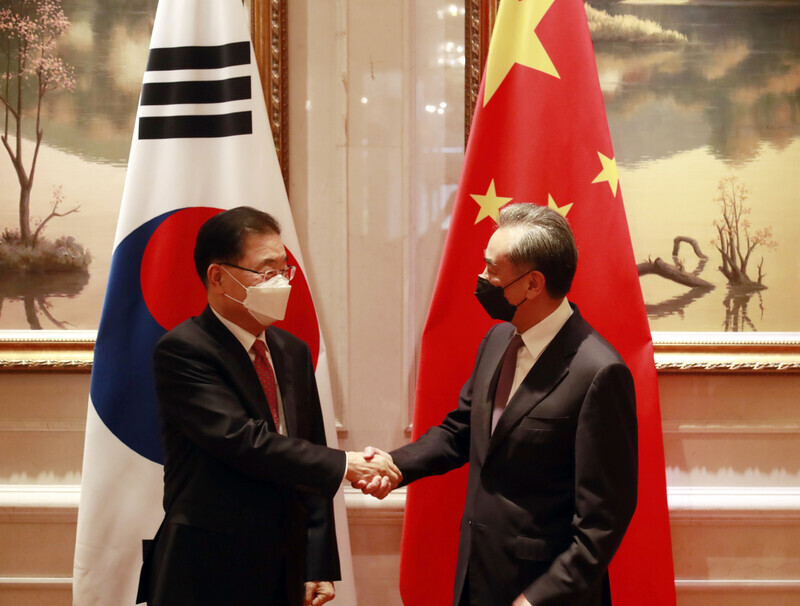hankyoreh
Links to other country sites 다른 나라 사이트 링크
US Indo-Pacific strategy fuels conflict, Chinese foreign minister tells S. Korean foreign minister

China sternly criticized Washington’s “Indo-Pacific strategy” and stressed the importance of “political consensus” with Seoul in a telephone conversation Wednesday between the South Korean and Chinese foreign ministers.
The conversation is drawing attention for coming just ahead of South Korea’s participation as an invited guest at the G7 summit, where measures for reining Beijing in appear likely to be discussed in depth.
In an announcement by the Chinese Foreign Ministry on Thursday, Foreign Minister Wang Yi was quoted as saying that “under the guidance of the consensus reached by the two heads of state, China-ROK relations have been developed smoothly.”
He also reportedly said China and South Korea need to strengthen communication in a timely manner as strategic partners.
“Next year will be the 30th anniversary of the establishment of diplomatic ties between China and the ROK. The two sides should [...] create a sound atmosphere and necessary conditions for the continued and steady development of bilateral relations,” the statement quoted Wang as saying.
Particular attention is focusing on the message conveyed to Chung amid Wang’s criticism of US policy.
“The Indo-Pacific strategy proposed by the United States is full of Cold War mentality and stirs up confrontation among different groups, which is not conducive to regional peace, stability and development,” Wang was quoted as saying.
“China is firmly opposed to it,” he added.
“As friendly neighbors and strategic partners, China and the ROK should know well the rights and wrongs, stick to the correct position, abide by political consensus and never be misled,” he continued, according to the statement.
In response, Chung was quoted by the Chinese Foreign Ministry as saying that South Korea “attaches great importance to developing the strategic cooperative partnership with China, adheres to the one-China principle and fully recognizes the sensitivity of cross-Straits [PRC-Taiwan] relations.”
The quotes suggest that in response to Wang’s warning against participating in a US-led anti-China “front” — including the Indo-Pacific strategy — Chung replied that he understood Beijing’s position.
But the South Korean Ministry of Foreign Affairs (MOFA) reported a different position in its announcement.
In a press release on the outcome of the conversation the day before, the MOFA said Chung had expressed his position that “cooperation between the US and China in responding to global challenges accords with the international community’s interests” and his “hope that US-China relations will develop in a stable way.”
The MOFA suggested that Chung “said what needed to be said,” even at the risk of stepping on Beijing’s toes.
In response to analysts who saw Wang as sending Seoul a warning not to lean too far in Washington’s direction ahead of the G7 summit, a MOFA official told reporters that the mood of the conversation was not unfriendly, explaining that China had “emphasized its established position.”
The same official added that the conversation had been scheduled previously between the two sides and “was not [organized] with the G7 in mind.”
In an unusual step, the official also stated that South Korea had requested the conversation while cautioning against reading too much into that information.
In a regular briefing Thursday, Chinese Foreign Ministry spokesperson Wang Wenbin avoided giving an immediate answer when asked whether Wang’s remarks were in reference to the G7 summit.
“We believe this is a successful phone call, during which the two sides reached broad consensus on bilateral relations and issues of mutual interest. We stand ready to work with the ROK to implement relevant consensus and move bilateral relations forward,” he replied.
By Jung In-hwan, Beijing correspondent
Please direct comments or questions to [english@hani.co.kr]

Editorial・opinion
![[Editorial] Penalties for airing allegations against Korea’s first lady endanger free press [Editorial] Penalties for airing allegations against Korea’s first lady endanger free press](https://flexible.img.hani.co.kr/flexible/normal/500/300/imgdb/original/2024/0502/1817146398095106.jpg) [Editorial] Penalties for airing allegations against Korea’s first lady endanger free press
[Editorial] Penalties for airing allegations against Korea’s first lady endanger free press![[Editorial] Yoon must halt procurement of SM-3 interceptor missiles [Editorial] Yoon must halt procurement of SM-3 interceptor missiles](https://flexible.img.hani.co.kr/flexible/normal/500/300/imgdb/child/2024/0501/17145495551605_1717145495195344.jpg) [Editorial] Yoon must halt procurement of SM-3 interceptor missiles
[Editorial] Yoon must halt procurement of SM-3 interceptor missiles- [Guest essay] Maybe Korea’s rapid population decline is an opportunity, not a crisis
- [Column] Can Yoon steer diplomacy with Russia, China back on track?
- [Column] Season 2 of special prosecutor probe may be coming to Korea soon
- [Column] Park Geun-hye déjà vu in Yoon Suk-yeol
- [Editorial] New weight of N. Korea’s nuclear threats makes dialogue all the more urgent
- [Guest essay] The real reason Korea’s new right wants to dub Rhee a founding father
- [Column] ‘Choson’: Is it time we start referring to N. Korea in its own terms?
- [Editorial] Japan’s rewriting of history with Korea has gone too far
Most viewed articles
- 160% of young Koreans see no need to have kids after marriage
- 2[Editorial] Japan’s rewriting of history with Korea has gone too far
- 3Vietnamese war victims speak of sexual violence by S. Korean troops for the first time
- 4For survivor, Jeju April 3 massacre is a living reality, not dead history
- 5[Column] Park Geun-hye déjà vu in Yoon Suk-yeol
- 6[Reporter’s notebook] In Min’s world, she’s the artist — and NewJeans is her art
- 7[Editorial] Penalties for airing allegations against Korea’s first lady endanger free press
- 8Presidential office warns of veto in response to opposition passing special counsel probe act
- 9Hybe-Ador dispute shines light on pervasive issues behind K-pop’s tidy facade
- 10[Special Feature Series: April 3 Jeju Uprising, Part III] US culpability for the bloodshed on Jeju I